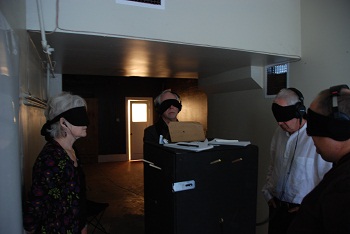Sound performance and Talk: Roxanne Varzi - The Whole World Blind

Performance Thursday, December 15, 2011, 6 - 10 p.m.
Talk Thursday, December 15, 2011, 8:30 p.m.
This work is a self-contained sound performance that involves the audience member blindfolding him or herself, then putting on headphones connected to an mp3 player and listening to the narrative loop of a “museum curator” in a gallery who offers to describe for our blinded audience a show she has done on war photography. Throughout is a guided meditation that interrupts the slideshow to relieve the observer of the visual burden.
We hear the curator describe the images as she advances through them on a slide projector. The images she has chosen are from prestigious shows of Western war photographers since 2001 when the United States went to war in the Middle East. These photographs are ones that the artist/anthropologist has studied in galleries and researched from 2007-2011.
The artist/anthropologist will leave a notebook and ask listeners to comment, particularly about the experience of being blindfolded, and whether they can identify any of the photographs. The idea is that the work of art is also a social experiment/experience that will determine the value of turning off the image and whether the curatorial frame does the same work for or against or with an image that is or is not there.
Roxanne Varzi Artist Statement
"Departing from the idea that seeing is believing and moving toward the theories that Virginia Woolf and Susan Sontag espoused that visuals often mislead if not outright lead to complacency and even engender disaster, this project aims to “see” visuals from recent and ongoing wars without looking. The aim here is not to call out particular places or photographers, but to do the opposite, to somehow neutralize the terror inherent in a war photograph becoming a market commodity, and a work of art. Like Woolf and Sontag in their books, I believe it necessary to describe but not to show war photographs in order to understand and respect the power they hold. Most photographs taken of people in the public sphere are of suffering and most of that suffering is manmade. Leaving a notebook for the audience to comment on allows us to determine how iconic these particular photographs have become in the past few years, if at all? Do the observers recognize them, even in their most muted form –metaphor? What can we sense about mortality and morality -- about war when we allow ourselves to be blinded? When we are forced to listen and imagine? When we stop privileging visuality and heighten our sense of sound? Can it tame the violence of the art? Can blindness lead us to a new kind of vision that would open a space for peace, love and beauty? This sound work will loop through a history of the present moment to bring us back to our originary question: is seeing believing? Perhaps the greatest pinnacle of vision resides in blindness. Just as the loudest message is born in silence."
For further information on Roxanne Varzi see: http://www.socsci.uci.edu